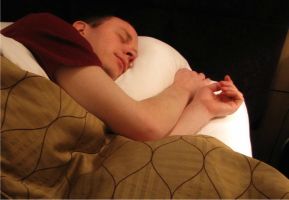Health and Mood
By: Other | March 10, 2015

Eat, Sleep, and Be Merry: How Your Health Regimen Impacts Your Mood
Written by Stefanie Platt, Psy.D.
As a child, I grew up in a household where my parents were ill-informed on the significance of nutrition. They were blessed with fast metabolisms; subsequently, they did not feel compelled to focus much attention on dietary needs or exercise in their lives or the lives of their children. We grew up in a household notoriously stocked with all of the desirable children’s snacks: cookies, chips, fruit roll-ups, and candy poured out of our pantries to the extent that childhood friends still talk about the copious amounts of junk food which awaited their visits to my childhood home.
Developing these bad eating habits and a lifestyle conducive to setting various physical and mental illnesses in motion was easy. Changing this lifestyle was difficult, but worthwhile, as it could have been detrimental to my health had I continued on my childhood trajectory. A few people in my family have diabetes, and I did not want to be another family statistic. Instead, I researched food consumption beyond the scope of caloric intake and found that taking care of one’s body is more than just preventative for physical health problems; it also promoted mental wellbeing.
- Sugar Intake: Sugar is a short-term stimulant that exacerbates stressful situations. Sugary foods can give you a temporary high, but a quick crash follows. Too much sugar consumption has also been linked to: nervous tension, anxiety, depression, irritability, tooth decay, gum disease, fatigue, negative thinking, and rapid cycling of blood sugar levels for those with hypoglycemia or diabetes.
Suggestions: Try natural sweet alternatives. Even honey or real maple syrup in moderation are less volatile. Rediscover how delicious fruits can be. Try eating raisins instead of candy. After a while you will notice that foods even lightly sugared taste too sweet.
- Caffeine: Caffeine has been linked to: anxiety, nervousness, insomnia, irritability, racing heart and aggravates insomnia, tension headaches, and hypertension.
Suggestions: Try slowly mixing decaffeinated products with your caffeinated ones. Remove a little more each time, until you’ve eliminated all the caffeine. Many decaf brands are quite tasty and there are many herbal products that can be fun to experiment with. The results of less caffeine can be profound.
-
- Exercise. Don’t be a couch potato! Being sedentary has been connected with depressive symptoms. Exercise releases endorphins, which create feelings of happiness and euphoria. It has also been connected in stress reduction, alleviating anxiety, and even improving memory.
- Improve the Circadian Rhythm. When being a “Night Owl” or an “Early Bird” are brought to extremes, they can disrupt a regular restful sleep pattern. In addition to reviewing “Tips For a Better Night’s Sleep” under “Resources” on our website, the following can be helpful for adjusting sleep patterns of the Night Owl and the Early Bird.
The Night Owl
This person may stay up late and have trouble arising in the morning. This is also known as the “delayed sleep phase syndrome” or DSPS.Treatment to help advance the sleep cycle (stimulate earlier sleep):- Start earlier sleep habits. (Go to bed one hour earlier each week until you are happy with your bedtime).
- Temporarily use a medication or supplement to initiate sleep
- Keep room dark in the evening (to help stimulate earlier production of melatonin).
- Use bright lights in the morning. You can just set your alarm clock and then open the shades or turn on a light in your room.
The Early Bird
This person goes to bed early and rises early. At the extreme, there is early morning awakening with difficulty going back to sleep. Treatment to help delay the sleep cycle (stimulate later sleep):- Begin sleep later (Go to bed one hour later each week until you are happy with your bedtime).
- Use bright lights in your home/bedroom late in the day to simulate daylight and to prevent release of melatonin.
- Keep your room dark in the morning by keeping the shades pulled or by using an eye cover
Techniques to help get to sleep
- Mindfulness sleep induction technique
- Progressive muscle relaxation
- Guided Imagery/Visualization Tapes
Overall, it is important to take care of yourself physically to reap benefits physically AND mentally. So, put your health first- it’s worth it!



